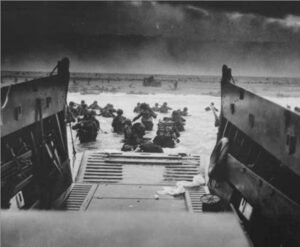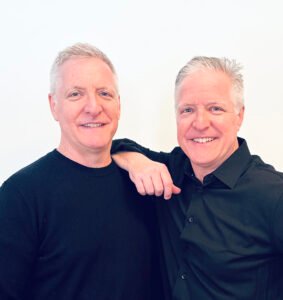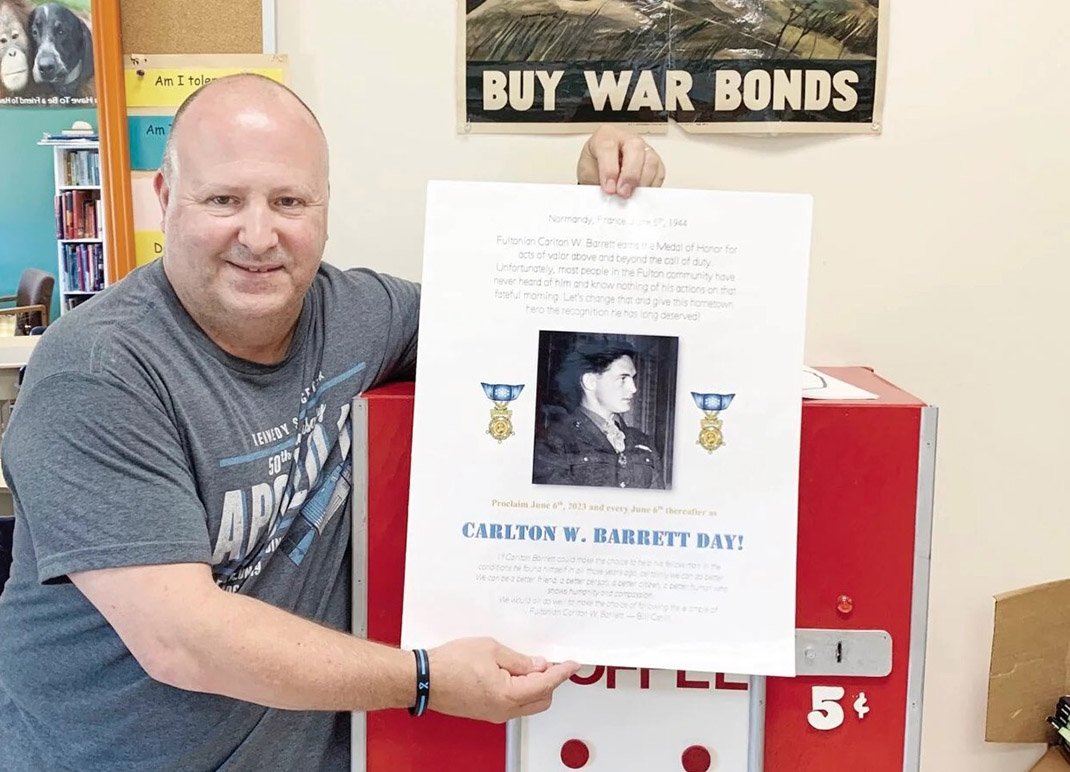Fulton’s Carlton W. Barrett is remembered through the efforts of Volney Elementary School teacher
By Tom and Jerry Caraccioli

In 2015, Volney Elementary sixth grade teacher Bill Cahill was attending the Fulton City School District meeting discussing the newly-created and state-mandated “character education curriculum.”
Discussions were taking place on who the Fulton City School District should exemplify in the new curriculum.
Rick Bush, a colleague of Cahill’s, took the floor to recommend a Fulton native who was a World War II veteran. Many in attendance wondered who is that? After the short presentation, Cahill, a 27-year veteran of the classroom, knew he needed to learn more about Pfc. Carlton W. Barrett.
What Cahill learned in his brief research encouraged him to dig even deeper.
On June 6, 1944, at 6:30 a.m., local time, Pfc. Barrett, along with 160,000 members of the Allied Forces, including 34,000 American infantrymen, stormed the beaches of Normandy, France. Under unimaginable heavy German artillery fire from the cliffs and bluffs above the beach, the 5-foot-4, 125-pound, First Infantry Division private was one of the first Americans to land on Omaha Beach on D-Day as part of the first wave of Allied Forces to arrive.
The Fulton native served as a guide helping to direct his fellow countrymen and other Allied Forces members ashore while also helping to establish vital communications.

Amid the carnage, chaos and confusion of the day, Barrett was shot three times — through both hips and the thigh — and refused medical attention. Despite his wounds, he continued to guide wounded and shocked troops to evacuation boats, while also saving lives of drowning infantrymen caught in the waves while carrying an average of 70-100 pounds of equipment, artillery and personal gear on their backs.
“His unit — Big Red One — was running communications up and down the beach fully exposed to enemy fire, which is how he got his wounds,” Cahill explained. “He also had set up a triage area with the medics. Once the medics would stabilize a wounded colleague, Barrett would swim them out to the evacuation boat. On the way back to the beach, he would encounter guys that were floundering in the water and help them swim into the beach.”
It was only after a mortar explosion wounded Barrett’s foot late in the morning of the invasion, that the private swam himself out to an evacuation boat and off the beach.
The efforts of Barrett and the Allied Forces that day ultimately established a Western Front in Europe, helped bring an end to World War II and eliminated Adolf Hitler and Nazi tyranny.
On June 7, 1944, President Franklin D. Roosevelt addressed the nation by honoring the fallen and still standing members of the Allied Forces that stormed the beaches of Normandy in order to ensure world peace: “They fight to end conquest. They fight to let justice arise.”
For his bravery, Barrett, along with two others — John J. Pinder Jr. and Jimmie W. Monteith — were awarded the Congressional Medal of Honor for “acts of service and valor above and beyond the call of duty” during their time on Omaha Beach. Four thousand four-hundred and fourteen Allied Troops — including 2,501 Americans — never made it home from the Normandy invasion. Pinder and Monteith were among those casualties. Barrett was the only surviving Medal of Honor recipient who The citation recalling Barrett’s heroics on D-Day during his Medal of Honor ceremony read:
“On the morning of D-Day Pvt. Barrett, landing in the face of extremely heavy enemy fire, was forced to wade ashore in neck-deep water. Disregarding the personal danger, he returned to the surf again and again to assist floundering comrades and save them from drowning. Refusing to remain pinned down by the intense barrage of small-arms and mortar fire poured at the landing points, Pvt. Barrett, working with fierce determination, saved many lives by carrying casualties to an evacuation boat lying offshore. In addition to his assigned mission as guide, he carried dispatches the length of the fire-swept beach; he assisted the wounded; he calmed the shocked; he arose as a leader in the stress of the occasion.”
Before Barrett died in 1986, he said the following about receiving the Medal of Honor, “I don’t think I deserve any more credit than anyone else who was on the beach on D-Day. I did what I was taught to do. The infantry is a team, you know, and I was just doing my job as a member of the team.”
“His humility is one of the teachable moments for the kids because humility is so rare in the 21st century,” Cahill said. “Whether you follow sports or celebrities, the world has become such a me, me, me society. History tells us, when he [Barrett] was needed by his country and fellow soldiers, he was there for them. I argue his service is needed again in the 21st century to be a model of humility and thinking of something bigger than yourself. To me, that’s a very powerful and important message for us to be instilling in our students.”
After nearly eight years of work trying to promote and make Fultonians, Central New Yorkers and New York state politicians understand the magnitude of the bravery Barrett displayed that day, Cahill finally broke through.
On April 24, 2023, Cahill and his wife, Oswego City School District teacher, Jennifer Cahill, were special guests of New York State Assembly Minority Leader Honorable Will Barclay (R-Pulaski) on the floor of the Assembly in Albany. Barclay introduced a resolution proclaiming June 6, 2023, as Carlton W. Barrett Day in the city of Fulton.
“Will Barclay and his office have been a great help to me in all of this,” Cahill said. “It was very overwhelming. I’m emotional right now remembering and talking about it. It was one of the most amazing experiences of my life and it was very important to have my wife, Jennifer, there because she has been amazingly supportive and a big help on what I’m trying to do.”
Today, June 6, is not only a reminder of a glorious and horrific day in American history; it also stands as Carlton W. Barrett Day in his hometown. Cahill has worked to make sure the heroics of Barrett, as well as all veterans serving from the Central New York city of Fulton are honored for their sacrifice and service.
Today’s heroes don’t have to storm beaches and rid the world of tyranny like they did in 1944. Barrett and his Greatest Generation mates made sure of that. Today’s heroes are making their voices heard in order to help create change because they can. Today’s heroes understand the sacrifices that were made and want to make sure future voices are never muted.
Today’s heroes are standing in front of students in classrooms, teaching future generations to never forget the brave men and women of the past.
And if by chance they are forgotten — do something about it.
 Tom and Jerry Caraccioli are freelance writers originally from Oswego, who have co-authored three books: “STRIKING SILVER: The Untold Story of America’s Forgotten Hockey Team,” “BOYCOTT: Stolen Dreams of the 1980 Moscow Olympic Games” and “Ice Breakers.”
Tom and Jerry Caraccioli are freelance writers originally from Oswego, who have co-authored three books: “STRIKING SILVER: The Untold Story of America’s Forgotten Hockey Team,” “BOYCOTT: Stolen Dreams of the 1980 Moscow Olympic Games” and “Ice Breakers.”




